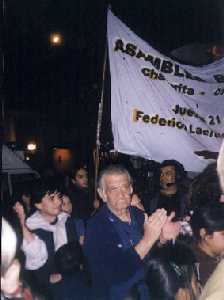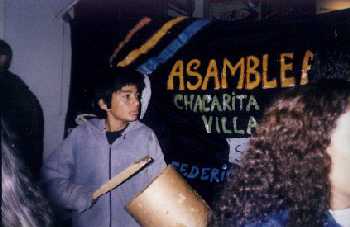 An elderly couple and several hundred potbanging neighbors held a Buenos Aires bank hostage Wednesday night,forcing the bank to give the couple back half of the money in their savings account. The Colegiales branch of Banco de la Nacion on Avenida Federico de la Croze was surrounded by passing neighbors and people from two different neighborhood assemblies as the couple, Norma and Roberto Marquez, 81 and 86, held a sit-in inside the bank, defying Argentina's six month long bank freeze.
An elderly couple and several hundred potbanging neighbors held a Buenos Aires bank hostage Wednesday night,forcing the bank to give the couple back half of the money in their savings account. The Colegiales branch of Banco de la Nacion on Avenida Federico de la Croze was surrounded by passing neighbors and people from two different neighborhood assemblies as the couple, Norma and Roberto Marquez, 81 and 86, held a sit-in inside the bank, defying Argentina's six month long bank freeze.
The couple went to the bank at eleven o'clock in the morning with a judge's order authorizing them to take out the $38,000 in savings which they had in their account. But when they got there, they were told to wait while bank officials decided whether to honor the judge's decree or not. Seven hours later they finally got their answer, a single word faxed from the central bank: no. Bank officials told them the judge's order was no longer applicable because the law had changed since the judge had signed the order. The couple decided to stay in the bank until they got their money.
"We worked hard for our life savings," said Norma. "They have no right to take it."
At seven o,clock in the evening they were still there, seated calmly and stubbornly in two chairs behind the plate glass window of the bank, facing the scattered crowd of neighbors and media that had gathered to watch them. Bank officials and police moved nervously about inside the bank, fearing to physically move them out because of the couple's advanced age. On the plate glass windows of the bank, handscrawled signs said: "We're going to stay until we get our money."
"I'm not leaving from here until the police drag me out," Norma, a tiny blonde woman, told a journalist through a crack in the door. Someone in the crowd said Norma had threatened to kill herself. It was Norma who did most of the talking. Her grey-haired husband Roberto sat quietly next to her, looking tired,with a thick square bandage on his forehead. Their son in law, Pablo Perrin, a tall man in a dark grey suit, passed out flyers outside. "Her daughter is unemployed," he said, "and I'm unemployed. Aside from their pension of 150 pesos a month, (about fifty dollars) their savings is all the money they have to live on."
At eight o'clock the members of the neighborhood assembly of Colegiales showed up. First about eight, then fifteen, then thirty. Holding their assembly banner and waving the Argentine flag, they began banging pots and chanting ""Give the abuelitos (little grandparents) back their money!" and "Que se vayan todos! ("Get rid of everybody," referring to corrupt politicians.) Pretty soon other people in the crowd were chanting and banging pots too. "Give them back their money!" From down the street, some of the streetcorner boys who recycle cardboard came with drums, and added their drumbeats and voices to the chant:"GIVE THEM BACK THEIR MONEY!" The neighborhood assembly of Colegiales was joined by the Colegiales-Chacarita neighborhood assembly, who attached their own black and yellow banner to the side of the bank.
In less than an hour, the crowd grew from a handful of neighbors to around three hundred, with people spilling out onto the street and banging on the side of the bank. The noise was deafening: journalists who wanted to talk to the old couple tried to get the potbangers to quiet down. 'You tell them that it's either the IMF or the people," shouted one red-headed woman. "You write that down!" Another woman began a shouting match with a member of the team from the Buenos Aies television station Channel 13. "You aren't even showing the neighbors outside, are you?" She said. "You're all part of the Clarin media empire, you guys never tell the truth!" "Lady, lady, I'm just an employee here, I'm a worker!" The guy from Channel 13 said. But it was true: most of the cameras were focused on what was going on inside the bank, and very few of them were showing the angry potbanging neighbors.
 Finally, at about nine o'clock, a bank official came to the door. "They're going to get their money," he said. "Tomorrow. Now please, go home. Please don't break any windows." The man sounded desperate. The banging of the pots and pans were so loud the man could barely be heard. "They're going to get their money tomorrow" the word was passed through the crowd. "Please," a media spokesperson said to the angry neighbors," the old folks have asked that you be quiet for just awhile." The neighbors calmed down, and waited. But eventually the banging and shouting started up again.
Finally, at about nine o'clock, a bank official came to the door. "They're going to get their money," he said. "Tomorrow. Now please, go home. Please don't break any windows." The man sounded desperate. The banging of the pots and pans were so loud the man could barely be heard. "They're going to get their money tomorrow" the word was passed through the crowd. "Please," a media spokesperson said to the angry neighbors," the old folks have asked that you be quiet for just awhile." The neighbors calmed down, and waited. But eventually the banging and shouting started up again.
One of the men wedged into the group of journalists pressed up against the plate glass windows of the bank said, "They're terrified inside. They still have all those bank employees to get out of the bank, and they're afraid the crowd is going to kill them if they let them out through the front door."
Suddenly an ambulance drove up, its siren still on. The door opened just long enough to let three uniformed attendants walk briskly into the bank. When it opened again, a panic stricken young bank employee with his body clenched in an embryonic position and his hands over his ears was quickly wheeled out in a wheel chair. The crowd ignored him and kept up their banging and shouting.
Finally, the doors opened and Norma and Roberta appeared, with Norma leading the way. The neighbors broke into applause. "Thank you!" They shouted. "Thank you Norma!" Some of them hugged her. The crowd of camera people and journalists elbowed each other to get their microphones in front of Norma. Norma was calm. She was smiling. They were going to get half of their savings, she said. In dollars. Her husband looked tired, but satisfied.
A journalist asked their son in law Pablo Perrin why the bank had finally given Norma and Roberto their money. "Because of the pressure of the people, that's why," he said quietly.